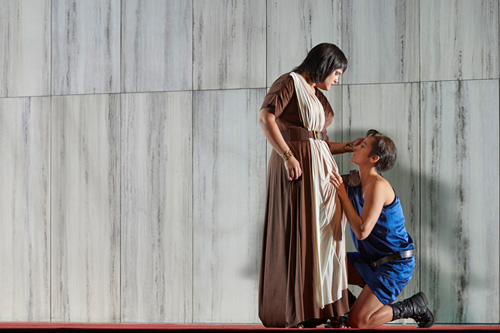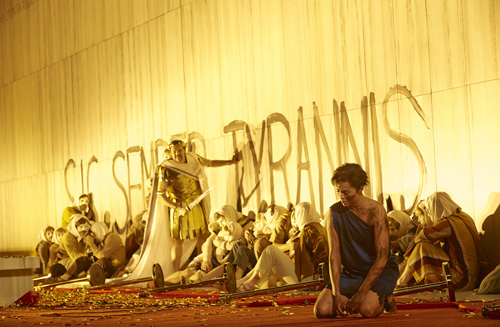-
Opera and the need for interpretation
By Danielle D'OrnellasPosted in Opera Appreciation
Recently, the National Post published two opposing opinion pieces regarding the relevance of opera today and, in particular, the Canadian Opera Company’s role in that discussion: one was published on February 22 by Terence Corcoran, and one by Robert Cushman which ran on March 1. We have truncated them both below with links to the full pieces for your perusal.
Keeping in mind that all opinions are important to us, we appreciate Mr. Cushman’s ability to articulate in print what we strive so hard to illustrate on stage – that the very nature of the performing arts is one of constant mutability, one that responds to an ever-changing cultural landscape and social environment, and one that is the result of the inevitability of interpretation.
A philosophy central to the Canadian Opera Company’s artistic mandate is not to simply accept the status quo, but to find meanings in these great works of art that haven’t been found before, and, by gathering together the world’s finest artists, we strive to contribute to a continuously evolving engagement with these profound explorations of the human condition.
Terence Corcoran, National Post, February 22, 2012 (edited for length)
"In two separate productions that close this weekend — Mozart’s La clemenza di Tito and Wagner’s Tristan und Isolde — the COC seems determined to demonstrate that these operas are indeed moribund, and that the only way to keep them alive is to inject them with absurd theatrics, full-frontal nudity, gender-bending scenes, imputed homosexuality and the usual post-modern reworkings that often mock the originals."
"During Act I of Wagner’s five-hour epic of love, betrayal and mind-wrenching existential craziness, Tristan and Isolde become tiny figures on a stage dwarfed by a giant IMAX-scale video of a man and a woman undressing in slow motion. The striptease takes place at a glacial pace over about 15 minutes, ultimately leaving the audience to assess the breasts, genitals and other body parts of a couple of thirty-somethings."
"The opera’s real scene-stealer is Franz-Josef Selig, the German bass who plays King Marke. He’s furious that Tristan has betrayed him by stealing his beloved Isolde. Or is he? In current thinking, the real source of Marke’s fury is said to be his past homosexual relationship with Tristan. There’s nothing in the libretto to suggest this idea except a line where Marke says (speaking of himself in the third person) that when his wife “died childless Marke loved you so that he never would re‑marry."
"Gender bending in opera is nothing new, but playing with sexual identity seems to have been rising steadily as a motif over the last couple of decades. Being a some-time opera goer, I hadn’t realized how pervasive it was."
"In Mozart’s day, male soprano voices could be provided by castrati. They’re in short supply these days, which means that women play the role of men who are in love with women. Nothing wrong with that, except that current productions seem to think that the drama – and the beauty of the singing — is enhanced if the female-female embracing and/or kissing is carried out in the most extreme way possible.
"On this evidence, opera is moribund. It’s an art form that strives to keep its audiences with increasing doses of sex, purple pajamas and self-parody. The Philistines are in the tent!"
To read the full article, click here.

Robert Cushman's response, National Post, March 1, 2012 (edited for length)
"There are some arts, like painting and sculpture, that can stay as they are, through the ages, without mediation. Literature can do the same, as long as it remains in its original language; as soon as it’s translated, it is, unavoidably, transformed according to the personal choices of the translator. And there are the performing arts — music, drama, dance, opera, the last one combining at least two of the previous three — that don’t exist until they’re transformed. Or, to use a less contentious term, “interpreted.”
"We know that Shakespeare wrote most (not all) of his plays to be performed in daylight, in the open air, with the audience standing in a courtyard and probably surrounded by pickpockets and prostitutes, and (this does apply to all the plays) with the women’s roles played by boys. Yet somehow, I don’t believe that those staging conditions are what the people who clamour for “straight” productions of Shakespeare have in mind. What they’re yearning for are productions like the ones they themselves grew up on. It’s an understandable feeling, and I’m not immune to it myself. But one shouldn’t confuse nostalgia for the 1950s with fidelity to the 1590s."
"The fallback position I’ve adopted is this. We can’t know a dead author’s intentions. (Or, quite often, a living one’s. ...What we do have is a text — the piece as it exists before it goes into rehearsal — and that text, if it’s worth doing at all, has, not so much a meaning as an identity. But that identity can only be discovered in rehearsal and realized in performance: freshly every time, by each cast and each audience."
"Mozart’s Titus is revered for, and prides himself on, his quality of mercy. And he may have been quite sincere and untroubled about it. Equally, he may have been desperate to think well of himself; it’s a perfectly plausible interpretation, and one carried out here with great comic aplomb. (Mozart, who spent much of his career writing comic operas, is unlikely to have put his sense of humour on hold here.) Nor, given the production’s overall scenic playfulness, did I object when Titus contacted the senate via a red telephone. Of course he wouldn’t historically have done that, but then he wouldn’t historically have been singing in Italian rather than talking in Latin. In context, the phone made good sense."
"So did having the would-be tyrannicide Sesto paint anti-imperial slogans on the wall, like an earnest modern revolutionary. He’s one of two characters in the opera originally written to be sung by male castrati. Honouring the composer’s intentions in this regard really would be the unkindest cut of all, so nowadays the roles are sung by women. This being the case, gender-bending comes with the territory. People who complain about an over-emphasis on sex in these and other productions of both plays and operas seem to think that our ancestors had cleaner minds than we do. There is no evidence for this."
"Sex is actually what theatre is about. What it isn’t about is recovering conventions that are irrecoverable and honouring intentions that are unknowable. We have to do the best we can with what we have and who we are. “Pastiche” isn’t the first word that comes to mind for that endeavour. But it will do."To read the full article, click here.
Photo: (top) (l – r) Keri Alkema as Vitellia and Isabel Leonard as Sesto; (bottom) Michael Schade (standing) as Tito and Isabel Leonard as Sesto. From the Canadian Opera Company’s production of La clemenza di Tito, 2013. Photos: Michael Cooper.
